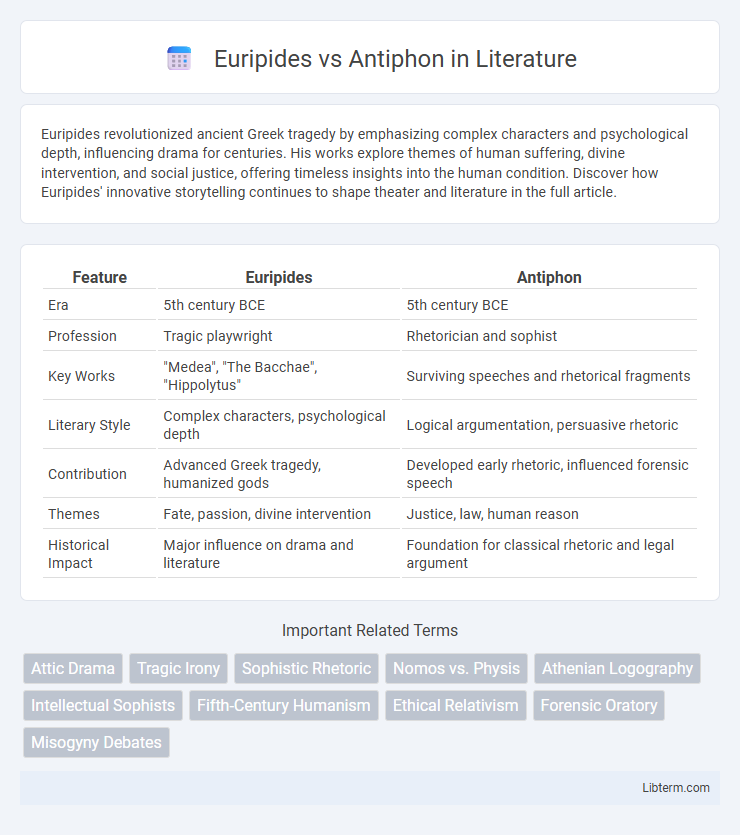Euripides revolutionized ancient Greek tragedy by emphasizing complex characters and psychological depth, influencing drama for centuries. His works explore themes of human suffering, divine intervention, and social justice, offering timeless insights into the human condition. Discover how Euripides' innovative storytelling continues to shape theater and literature in the full article.
Table of Comparison
| Feature | Euripides | Antiphon |
|---|---|---|
| Era | 5th century BCE | 5th century BCE |
| Profession | Tragic playwright | Rhetorician and sophist |
| Key Works | "Medea", "The Bacchae", "Hippolytus" | Surviving speeches and rhetorical fragments |
| Literary Style | Complex characters, psychological depth | Logical argumentation, persuasive rhetoric |
| Contribution | Advanced Greek tragedy, humanized gods | Developed early rhetoric, influenced forensic speech |
| Themes | Fate, passion, divine intervention | Justice, law, human reason |
| Historical Impact | Major influence on drama and literature | Foundation for classical rhetoric and legal argument |
Introduction to Euripides and Antiphon
Euripides, a classical Athenian tragedian born around 480 BCE, is celebrated for his innovative approach to drama, emphasizing psychological complexity and social themes in works like "Medea" and "The Bacchae." Antiphon, an early 5th-century BCE Athenian orator and logographer, is recognized for pioneering techniques in forensic speechwriting and rhetorical theory that influenced later classical rhetoric. The contrast between Euripides' tragic poetry and Antiphon's contributions to legal oratory highlights distinct facets of Athenian intellectual culture during the classical period.
Historical Context and Background
Euripides, a 5th-century BCE Athenian tragedian, shaped classical Greek drama during the height of the Peloponnesian War, reflecting the social and political turmoil of Athens. Antiphon, a mid-5th-century BCE sophist and logographer, contributed to the development of rhetoric and legal speechwriting amid Athens' evolving democratic institutions. Their works embody differing facets of classical Greek intellectual life: Euripides through dramatic exploration of human psychology and societal issues, and Antiphon through juridical oratory and philosophical skepticism.
Philosophical Influences and Beliefs
Euripides' tragedies reveal profound engagement with Socratic philosophy, emphasizing human emotion and rational inquiry within mythology, often challenging traditional moral values through complex character psychology. Antiphon, primarily known as a sophist and orator, advocates for natural law and human reason over societal conventions, suggesting a more pragmatic and legalistic approach to ethics. The contrasting beliefs highlight Euripides' dramatic exploration of ethical ambiguity versus Antiphon's emphasis on logical argumentation and normative jurisprudence.
Literary Styles and Genres
Euripides is renowned for his tragic dramas that emphasize psychological depth and complex characters, often exploring themes of suffering and human emotion through intense dialogue and innovative dramatic structure. Antiphon, primarily recognized as an early orator and logographer, employed a rhetorical style characterized by formal legal argumentation and persuasive speech, focusing on forensic and political contexts rather than dramatic storytelling. While Euripides' work is emblematic of classical tragedy with mythological narratives, Antiphon's contributions lie in the realm of prose rhetoric, shaping the development of Greek forensic oratory.
Perspectives on Justice and Morality
Euripides presents justice and morality through complex human emotions and moral ambiguity, often challenging traditional values by showcasing flawed heroes and the consequences of divine influence. Antiphon, as an early sophist, emphasizes rationality and the social conventions underpinning justice, advocating for laws as agreements rather than absolute moral truths. Their contrasting perspectives highlight a shift from mythological to rational interpretations of justice and ethical behavior in classical Greek thought.
Role of Women in Their Works
Euripides often portrayed women as complex, strong-willed characters challenging societal norms, evidenced in plays like "Medea" and "The Trojan Women," where female agency and suffering are central themes. In contrast, Antiphon's works, rooted in early Greek oratory, typically reflect more traditional views on women's roles, emphasizing their subordination and limited public presence. This contrast highlights Euripides' progressive approach to gender dynamics versus Antiphon's conservative perspective within classical Greek literature.
Approaches to Rhetoric and Argumentation
Euripides employed rhetorical strategies that emphasized emotional appeal and dramatic irony, using his plays to challenge societal norms and provoke critical reflection. Antiphon, known as a sophist and logographer, prioritized logical structure and forensic argumentation, crafting speeches that showcased analytical precision and persuasive clarity. Their contrasting approaches highlight Euripides' focus on pathos and ethical questioning versus Antiphon's commitment to ethos and rational argument construction.
Notable Works and Legacy
Euripides, a pivotal figure in classical Greek tragedy, is renowned for masterpieces such as "Medea," "The Bacchae," and "Hippolytus," which explore complex human emotions and societal issues, influencing dramatic literature profoundly. Antiphon, primarily known as a sophist and logographer, contributed significantly with his innovative rhetorical speeches and legal orations, though fewer of his works survive compared to Euripides' extensive tragic plays. The legacy of Euripides resides in his enduring impact on theatrical storytelling and psychological character development, while Antiphon's advancements in rhetoric and forensic oratory remain foundational in the study of classical Greek law and persuasion techniques.
Contributions to Greek Thought
Euripides revolutionized Greek tragedy by humanizing mythological characters and exploring complex psychological motivations, influencing subsequent drama and philosophy. Antiphon, an early sophist and logographer, contributed to Greek thought through his development of rhetoric and legal argumentation, laying groundwork for democratic discourse and methods of persuasion. Both figures shaped intellectual traditions: Euripides through dramatic literature and Antiphon through rhetoric and law, advancing critical examination of human nature and society.
Lasting Influence on Western Culture
Euripides reshaped Western drama through his complex character portrayals and exploration of social issues, influencing modern theater, literature, and psychology with themes of human struggle and emotion. Antiphon's contributions to rhetoric and early legal theory laid the groundwork for Western philosophical thought and jurisprudence, impacting democratic discourse and legal systems. Their combined legacies continue to shape Western cultural narratives by blending dramatic artistry with foundational principles of argumentation and justice.
Euripides Infographic

 libterm.com
libterm.com